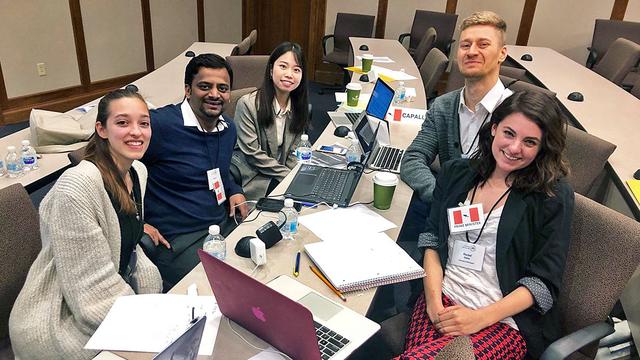Ben Gronowski (MHR ‘19), and Rachel Dame (MPP ‘19) at the NASPAA Batten competition in
Ann Arbor, Michigan.
It's not often that graduate students get a chance to address an international crisis with profound implications for global stability. But that’s just the real-world experience that several students from the Humphrey School of Public Affairs had during a day-long global competition that tested their skills in complex problem solving, data analysis, and leadership.
The five-person team from the Humphrey School earned a regional bronze medal in this year’s NASPAA-Batten Student Simulation Competition—a partnership between the University of Virginia’s Frank Batten School of Leadership and Public Policy and the Network of Schools of Public Policy, Affairs, and Administration (NASPAA).
A record 585 graduate students from 27 countries participated in the February 23 competition at 11 host sites around the world such as Dhaka, Cairo, Mexico City, and several US cities. The Humphrey School team—Rachel Dame (Master of Public Policy ‘19), Bingyan Wu (Master of Public Policy ‘19), Ben Gronowski (Master of Human Rights ‘19), Joy Hammer (Master of Human Rights ‘20), and Vishal Jamkar (Master of Development Practice ‘20)—competed at the University of Michigan’s Gerald R. Ford School of Public Policy in Ann Arbor, Michigan.
In the daylong competition, the students worked together in teams to solve a complex public policy problem—in this case forced migration—through computer‐based simulated gameplay.
The students described the experience as fast-paced and intensive. Each team member took on a role such as prime minister, minister of labor, or minister of health and human services in a virtual country and had to decide how to manage an influx of migrants. Each player was in charge of a distinct policy portfolio, and the decisions they made affected not only their own country but the other teams’ as well.
The Humphrey School team represented the fictitious country of Capalla.
“With very limited information, and facing a grave humanitarian crisis, we had to negotiate with other countries’ representatives to make a decision that was not only beneficial for the refugees but also for the country and its citizens,” Jamkar says. "The simulation was a great learning experience to understand the intricacies of refugee issues in a short span of time.”
The game challenged the students to weigh factors such as human rights, integration, and economic growth against budget restrictions and political resistance.
“The simulation was based on real statistics in Europe, so we got a sense of how policy makes a difference in the real world,” adds Wu. “It was also important to make tradeoffs between human rights and economic development.”
Associate Professor Jerry Zhao, who organized the team, notes that the student members represent a wide range of graduate programs at the Humphrey School.
"The NASPAA-Batten simulation competition is attracting more public affairs students from different countries," he says. "This is the second time we sent students to the competition, and the second time they came back with an award."
“The fact that our students performed so well in this year's competition speaks very highly of their academic preparation, their ability to work as a professional team, and their individual professionalism,” says Humphrey School Dean Laura Bloomberg. “They should be very proud; I certainly am!”
The simulation competition was first held in 2015 to provide public policy students from around the world more hands-on learning experiences.
“The Humphrey School has for years worked with NASPAA to establish this international student simulation exercise, because we believe that applied beyond-the-classroom learning opportunities are crucial to preparing our students for careers in the world of public service,” Bloomberg says.
The teams were evaluated by judges at their regional sites based on simulation scores, negotiation skills, team work, policy memos, and their final presentations.


